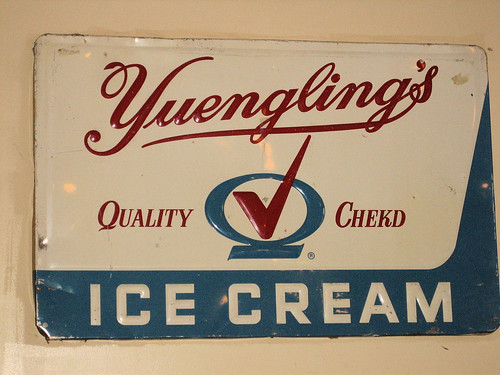Earlier this week, America noted the 83rd anniversary of the repeal of Prohibition. Craft Beer & Brewing Magazine marked the occasion with a short, well-intentioned piece on "Industries That Breweries Turned to During Prohibition."
The story began promisingly, if somewhat overwrought:
While the craft-beer industry is full of talented up-and-comers, there are a handful of breweries who survived one of the darkest—and supposedly driest—eras in the American brewing industry: Prohibition. The Temperance Movement sought to crack down on all the booze-guzzling heathens, and while pointing at the alcohol industry with one hand and clutching their pearls in the other, they shut the industry down. [...] But with a little ingenuity—and a whole lot of luck—some breweries survived. Many of them are thriving today, and so are some of their Prohibition side projects.
For example, Coors kilned high-tech ceramics; Yuengling churned ice cream.
But then the author, Libby Murphy, made this startling claim:
Unemployment soared after the breweries closed their doors. To make ends meet, many unemployed brewery employees turned to organized crime to keep food on the table, which, unsurprisingly, kept the underground liquor industry going stronger than ever.
Indeed, the record shows that bootlegging was rampant during Prohibition, but what is the source for Murphy's claim about law-breaking brewers? By "many," did she mean a plurality or a majority of brewers? Or did she merely assume that SOME brewery workers MIGHT have turned to organized crime? The word "many" certainly does not mean a few. This is so vague. She doesn't clarify.
As historian Maureen Ogle —author of Ambitious Brew: The Story of American Beer— told me:
Most breweries were long since out of business before Jan. 1, 1920. And companies that stayed open worked hard to keep employees in business (thus the efforts to diversify by, e.g., Yuengling, AB, Miller, etc. Did some [unemployed brewery employees turn to organized crime]? No doubt. Many? Doubtful.
Murphy's unemployment claim also seems suspect.
In 1919, when Prohibition was ratified, the unemployment rate sat at 2.3%. In 1921, a year after Prohibition had taken effect nationally, the rate did indeed jump dramatically, to 11.9%. But soon thereafter, it fell just as dramatically. In 1922, it was 7.6%; in 1926, 1.9%. The rate rose again, slightly, just before the Crash in late 1929, to 3.2%.
I found these data, with only a cursory web search, at the website for the National Bureau of Economic Research. Granted, the methodology and metrics of that era were most probably different than those of today. But the data do not support Murphy's claims.

Murphy has written a story of historical brewery interest, a feel-good story of American brewers, industrious under duress. When, in an offhand manner, she then placed those brewers' lawfulness in doubt, she should have provided proof. She didn't.
In the title to this post, I asked: Did American brewers really become gangsters during Prohibition? The answer: NOT PROVEN. Ms. Murphy has published an unfounded allegation.
-----more-----
- Read the original article at Craft Beer & Brewing. There, on the day of its publication, I submitted a brief version of this post as a comment. To date, there has been no response, or clarification, from Ms. Murphy.
- Yuengling Dairy would remain open after Repeal, continuing operations until 1981. CoorsTech continues to manufacture ceramics, independent of the brewery but owned by a trust of the Coors family.
- Read more on the passage of the 21st Amendment on 5 December 1933, at YFGF.
- As an ebook, Maureen Ogle will be releasing an online update to Ambitious Brew in the spring of 2017 —to cover the growth of 'craft' beer and the change of the American beer business since the book was published in 2006.
- For more from YFGF:
- Follow on Twitter: @Cizauskas.
- Like on Facebook: YoursForGoodFermentables.
- Follow on Flickr: Cizauskas.
- Follow on Instagram: @tcizauskas.









No comments:
Post a Comment
Comment here ...